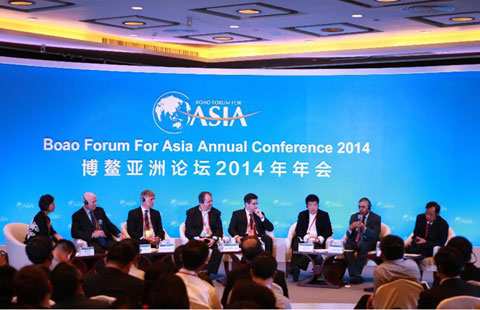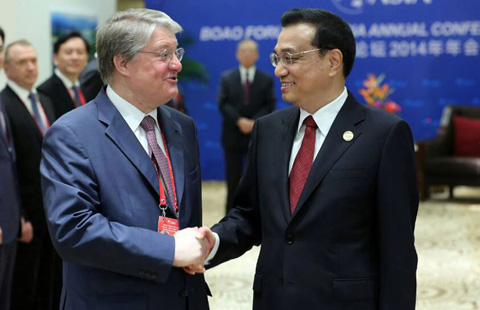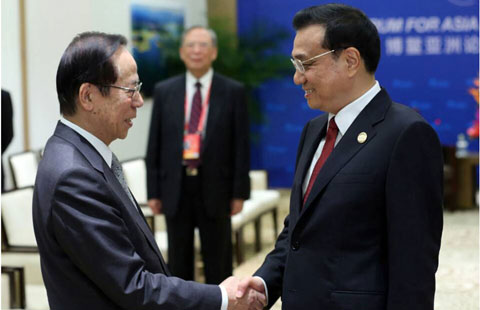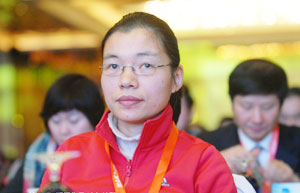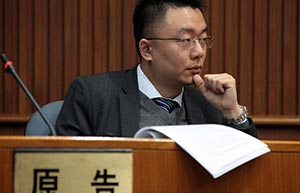Former WTO head: EU should stop lecturing China
By Martin Banks (chinadaily.com.cn) Updated: 2014-04-10 22:40The eight core sectors concern finance, taxation, state assets, social welfare, land, foreign investment, innovation and good governance.
And the reform packages aim to relax control over market access, launch social security and allow sales of collectively owned land.
Jorg Monar, Rector of the College of Europe, launched the seminar in Bruges, which attracted Chinese scholars, leading politicians, experts and senior representatives from the EU.
Another speaker, Zhang Lirong, the Brussels-based minister of the PRC to the EU, said the reform proposals could have a "very positive" impact on EU-China relations, especially if the two sides sign a "deep and meaningful" free trade agreement "in the next few years."
He also said he hopes the new round of reforms, involving some 336 different measures, will lead to a "deepening" of the China-EU relationship in various areas, including green growth and tackling issues as diverse as youth unemployment and demographic challenges.
He told the participants that "all in all, this round of reforms will, I hope, help us to work together even more closely in the future."
His sentiments were echoed by Wu Jianmin, a former Chinese ambassador to France, who also emphasized the importance of both the market-oriented and environmental reforms unveiled in November.
Wu said: "We need more market and by this I mean less government and a bigger role for the private sector. The private sector 35 years ago was very small but today it is a very vibrant force in the Chinese economy. I think most Chinese people understand the importance of reform in the financial sector and the need to further open up our markets."
He also stressed the importance of environmental reforms: "We have made incredible strides forward in the last 35 years but we have also paid a very heavy price in terms of environmental damage. For example, smog is a permanent feature in Beijing and this is something that needs addressing and fast."
Professor Chi Fulin, President of the China Institute for Reform and Development, urged Beijing to "seriously speed up" the reform of China's services sector, which has a significant smaller share of GDP than in almost all other economies.
He said: "The services sector is becoming very important for China and the aim of the reform should be to expand the service trade, develop service outsourcing and promote liberalization."
Chi, who is also a CPPCC member, predicted that the opening up of both the service and financial sectors will be "markedly accelerated" in the years up to 2020, the target date for the implementation of the new reforms.
Wu, who also wants to see speedy implementation of a "market oriented legal system", said that "as a big developing nation with a population of 1.3 billion, China still boasts huge growth potential."
Pierre Defraigne, director of the Madariaga College of Europe Foundation, also spoke at the seminar and emphasized the global significance of the Chinese reforms.
Another panelist, Professor Sylvain Plasschaert, a former World Bank fiscal economist, said it could be argued that China, despite EU anti dumping measures, had already achieved the status of a fully functioning market economy.
Gerhardt Stahl, secretary general of the Brussels-based Committee of the Regions, said that implementation of the reform programme was the "real challenge" facing China, while Hainan Airlines founder and chair Chen Feng cautioned that "time and patience" were required.
- China trying for regional trade pact by 2015: Premier
- SOEs in search of strategy for change amid reform drive
- Disney looks to tap Chinese spending power
- Bright Dairy in supply agreement with Pactum
- Shenyang county aiming to be nation's 'light aircraft capital'
- Full text of Li Keqiang's speech at opening ceremony of Boao Forum
- Li pledges equal treatment to foreign companies
- Li says all companies will get equal treatment in reforms
